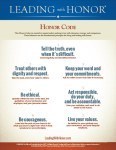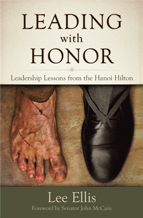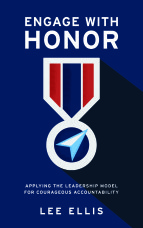The Reality of Dishonorable Leadership: 3 Tips to Avoiding Failure

The Triumphant David by Rosselli Triunfo
by Lee Ellis | Watch Lee’s Monthly Leadership Coaching on this topic – Instant Access with Free Registration – Click Here
From the smallest of indiscretions to the largest cover up, neglecting one’s duty and pursuing selfish choices is part of the human condition. Lest we think it’s a new concept, it’s been that way since the beginning of time. Consider the example of David, the shepherd boy who slew the giant Goliath and later became King. From his early youth, David had a reputation for his courage and his commitment to honor God.
David’s Selfishness and Dishonor
And then one spring when kings normally go off to war, he stayed home. That’s when his selfish and scandalous downfall began—on a warm day when he looked down from his roof and saw Bathsheba bathing. She happened to be the wife of one of his soldiers. David sent for her and had his way with her. When she became pregnant, David hatched a simple scheme to conceal his problem and protect Bathsheba from scandal—he would bring Bathsheba’s husband, Uriah, back from the war for a few days of R&R with his wife.
But Uriah—being a man of great honor and loyalty to his fellow soldiers—refused to go home to Bathsheba. Instead, he slept at the palace with the servants.
David’s cover-up ploy was foiled, so his deception intensified. He sent Uriah back to the battle with orders to Joab, his general, to make sure that Uriah was at the front of the attack. Then he was to pull back and let him be killed. It worked. Then David brought Bathsheba to the palace as his wife.
David’s Downward Spiral
David had been “a man after God’s own heart,” yet he had acted as though he could take what he wanted without consequences. When he feared his deeds would be exposed, he used his power to cover up, protect his image, and avoid the negative consequences. But accountability came, and it never went away.
David lost the trust and confidence of his people, and his life and leadership were never the same.
The Same Yesterday and Today
Isn’t it amazing how David’s story parallels so much of what we see today? It’s common to hear about a leader who commits a crime—or some ethical violation—and then weaves an intricate cover-up. And when that begins to unravel, we hear outright denials, and then the blame game escalates—along with more excuses, justifications, and rationalizations.
Typically, the whistle-blowers are demonized. And sometimes the guilty try to destroy the reputation of their accusers, or use their power to bury them figuratively—and sometimes literally.
In our modern times we’ve seen numerous political leaders follow this example. In a more benign way, we’ve seen three major automobile companies’ CEOs acknowledge honor failures (from Japan, US and Germany). A prominent international bank was fined $2.6 billion dollars for collaborating in tax evasion; governors and mayors and educators have gone to jail.
My Personal Example from the POW Camps
In the POW camps, we had three men who forsook their honor and collaborated with the enemy. Since they were senior officers who had been committed to the military for many years, and then upon capture switched sides on the war, one can only assume that they put self-interest above their duty and commitments—regardless of how they rationalized it.
We’re All Vulnerable
But the reality is that it’s not just a “they” or “them” problem. The truth is that we all carry this same mutated gene that drives our egos toward self-serving dishonorable behaviors. [Tweet This]
It’s in our nature to rationalize and make choices without really considering what’s ultimately at stake. But when honor fails, we all lose; when honor fails and there is a lack of accountability, there is grave damage to justice and freedom in the culture. [Tweet This]
In his book Man’s Search for Meaning, a worldwide best seller of the 20th century, Psychiatrist and WWII Holocaust survivor, Victor Frankl highlighted the challenge we face.
“In the concentration camps, for example, in this living laboratory and on this testing ground, we watched and witnessed some of our comrades behave like swine while others behaved like saints. Man has both potentialities within himself; which one is actualized depends on decisions but not on conditions.”
3 Tips to Make Honorable Choices
So what should you and I do about this innate problem that threatens even those most committed to living honorably? How can we make honorable choices and decisions?
Admit your vulnerability.
Accept the reality that you are capable of dis-honorable choices and behaviors. Admitting the problem of being human is the first step of prevention.
Be alert and self-monitor.
Pay attention so that you will recognize when you are starting to drift off course from your values. When you are on guard, you can correct back quickly and those early corrections are much easier to make.
Engage a support team to help.
The wisdom of justice is Nemo judex in causa sua — “no person can [objectively] be his own judge.” That’s why you need confidants who can help you be accountable. Without others to speak into our lives, we won’t notice the drift from the true north of our values. Others can help us realign our compass and avoid drift or make early corrections back to course.
From personal experience, I can tell you that it’s a daily battle to live and lead with honor. And if you ever assume you’ve mastered this issue, then you’ve just become very vulnerable.
You can read more on this subject in my upcoming book Engage with Honor: Building a Culture of Courageous Accountability . In the meantime, please share your comments and wisdom.
LE
 Free Offer! Common team values and ethics are critical for tactical, day-to-day success in team unity and execution. You’re invited to use the Honor Code from Lee Ellis as your foundational set of principles for operating as a team or organization. Download the Honor Code.
Free Offer! Common team values and ethics are critical for tactical, day-to-day success in team unity and execution. You’re invited to use the Honor Code from Lee Ellis as your foundational set of principles for operating as a team or organization. Download the Honor Code.
Related Resources:

Leading with Honor – Book

Engage with Honor – Coming in September 2016






